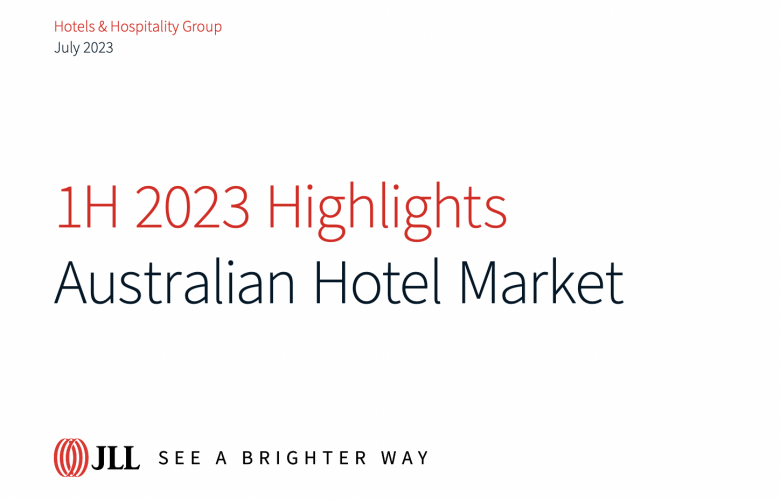Australian hotel investment remains strong over first half of 2023, despite current headwinds - JLL
Contact
Australian hotel investment remains strong over first half of 2023, despite current headwinds - JLL
JLL Hotels & Hospitality’s Australian Hotel Market 1H 2023 Highlights report reveals the key themes that have been evident over the first half of the year, across hotel trading, new supply, transactions, and debt.
The Australian hotel market continues to see a strong recovery across the board, highlighting the strength and attractiveness of the market’s fundamentals. Underpinned by the domestic leisure segment, all major city markets across Australia have now achieved a full RevPAR recovery to pre-Covid levels, driven by exceptional growth in average room rates. The markets showing stand-out performance relative to 2019 RevPAR levels are Brisbane (up 47% on 2019), Gold Coast (up 35%), Perth (up 32%) and Adelaide (up 23%). All of these markets are benefitting from strong domestic leisure demand coupled with an uptick in domestic corporate travel.
Australia has undergone one of its most significant new supply waves over the past four years, with many major markets’ hotel landscapes expanding, but encouragingly strong underlying demand is seeing this be readily absorbed. Melbourne has seen the largest majority of new hotels commence trading with 4,889 rooms (21 hotels) opening since the start of 2020, and now sees the Melbourne market surpass Sydney as the nation’s largest hotel market. In contrast, Sydney hotel supply has risen by 2,159 rooms across 13 new hotels.
“The new supply wave has greatly enhanced the overall product offering within the market and helped lift average rate ceilings, but thankfully this is largely being absorbed. The new supply also encourages existing properties to upgrade in order to compete, which is made all the more viable by the strong average room rates,” said Gus Moors, Managing Director, JLL Hotels & Hospitality Group. “As an asset class, hotels are now sitting in an interesting space. On the one hand, we are seeing groups look to convert office buildings into hotels, reflecting confidence in the sector relative to the office market, while on the other hand we are seeing hotels being converted to alternate use such as residential and BTR. Recent examples of this include the likes of the JLL advised transactions of Sir Stamford Circular Quay in Sydney, and Hotel Lindrum and Bayview Eden in Melbourne.”
The supply wave has also brought about the introduction of numerous new hotels and international brands over the first half of the year. Notable new openings in the first half include the Capella Sydney (192 rooms) and 202 Elizabeth (38 rooms) in Sydney, the Vibe Hotel (123 rooms) and Tryp by Wyndham (120 rooms) in Adelaide, and Nesuto Docklands (211 rooms) and Le Meridien (235 rooms) in Melbourne.
Mr Moors noted, “As we head into the back half of 2023, we are expecting to see softening in the domestic leisure segment, as current interest rate rises curb consumer’s discretionary spending and the pick-up in outbound international travel continues. However, the steady recovery of business travel and the meeting segment, significant calendar of world class events and festivals, as well as the ongoing rebound in international visitor arrivals will likely support demand in key gateway markets such as Sydney and Melbourne”.
“We have observed that despite the well documented ongoing headwinds, investment activity has also seen an uptick, albeit for assets that are aspirational, and those with genuine value-add potential,” said Peter Harper, Managing Director & Head of Investment Sales Australasia, JLL Hotels & Hospitality Group. “Hotel investment volumes over the first half reached around AUD 1.76 billion across 28 transactions (settled and exchanged), which in a strong sign of investor confidence is already 91% of the total annual volume last year. That said, the top five deals by value made up 64% (AUD 1.13 billion) of total transaction volumes, led by several landmark transactions the most recent of which was Sheraton Grand Mirage Resort and Escarpment Group portfolio.”
As was a similar trend last year, capital flows have been heavily weighted to domestic buyers, making up 86% of total investment volumes, although many of these investors have offshore limited partners. Of the offshore groups taking a direct position, Singapore investors have been the most active market.
“Despite the ongoing challenges surrounding hotel investment underwriting, investor interest in the hotel sector remains relatively high, driven by the fact that hotels are a natural hedge against inflation and have proved their resilience as an asset class over the past 24 months. JLL are projecting 2023 investment volumes to reach well in excess of AUD 2.2 billion for the full year,” Mr Harper said.







